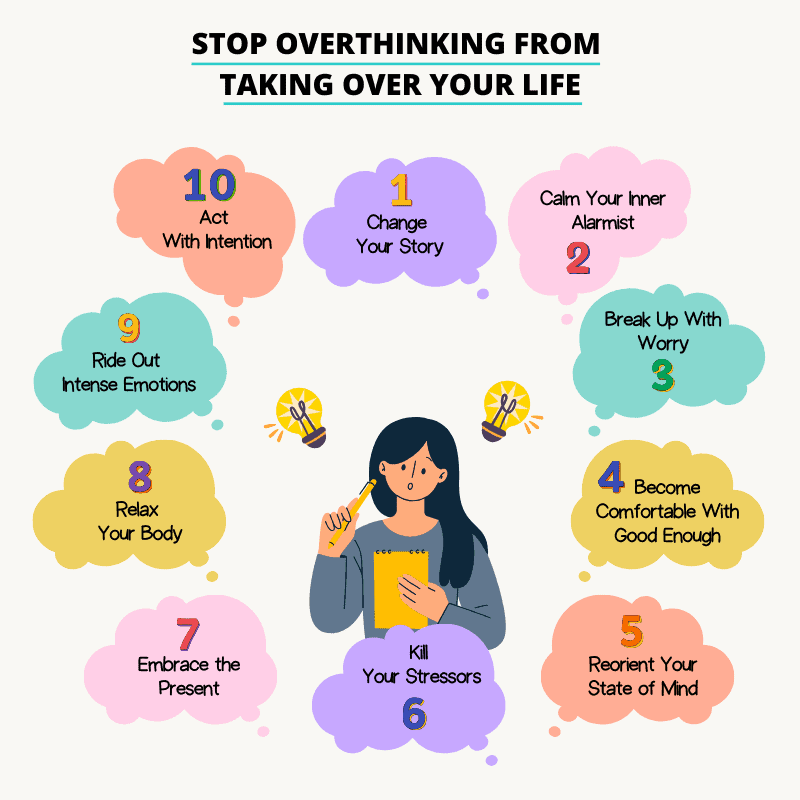Introduction
Overthinking and insomnia often go hand in hand, creating a vicious cycle that can feel impossible to escape. Overthinking, characterized by repetitive and excessive thoughts, can prevent the mind from relaxing, making it difficult to fall or stay asleep. Insomnia, in turn, exacerbates overthinking by leaving the brain fatigued and less equipped to manage stress effectively. This article explores the intricate connection between overthinking and insomnia, their effects on mental health, and practical strategies to break the cycle and reclaim restful sleep.
How Overthinking Leads to Insomnia

The Role of Stress and Anxiety
Overthinking typically stems from stress, anxiety, or unresolved concerns. These mental states activate the body’s fight or flight response, increasing the production of stress hormones like cortisol. Elevated cortisol levels disrupt the body’s natural sleep-wake cycle, making it harder to relax and fall asleep. When the brain is preoccupied with worrying thoughts, it struggles to transition into the restorative stages of sleep.
Racing Thoughts at Night
Many people find their overthinking intensifies at bedtime when external distractions are minimal. Without daytime activities to occupy the mind, unresolved problems, to-do lists, and hypothetical scenarios take center stage. This mental chatter keeps the brain in an alert state, delaying sleep onset and reducing sleep quality.
Sleep Deprivation Fuels Overthinking
Insufficient sleep amplifies overthinking by impairing cognitive function and emotional regulation. A sleep-deprived brain is less capable of processing emotions and rationalizing worries, leading to an increase in anxious or repetitive thoughts. This creates a feedback loop: overthinking causes insomnia, and insomnia worsens overthinking.
Effects of Overthinking and Insomnia on Mental Health
The combination of overthinking and insomnia can significantly impact mental health. Prolonged sleep deprivation weakens the brain’s ability to cope with stress, making individuals more prone to anxiety, depression, and irritability. Over time, the lack of restful sleep can lead to chronic fatigue, reduced concentration, and a diminished quality of life. Addressing this cycle is crucial to maintaining both mental and physical well-being.
Breaking the Cycle: How to Stop Overthinking and Improve Sleep

1. Establish a Relaxing Bedtime Routine
Creating a consistent pre-sleep routine can signal to your brain that it’s time to wind down. Activities like reading a book, taking a warm bath, or practicing deep breathing exercises can help calm racing thoughts. Avoid stimulating activities such as watching TV, using your phone, or working right before bed.
2. Practice Mindfulness and Meditation
Mindfulness and meditation techniques can help quiet a restless mind by focusing on the present moment. Guided meditations, progressive muscle relaxation, or mindfulness exercises like focusing on your breath can reduce the intensity of overthinking and promote relaxation.
3. Write Down Your Thoughts
Journaling is a powerful tool for managing overthinking. Spend a few minutes each evening writing down your worries, tasks, or anything on your mind. This practice can help offload mental clutter, making it easier to relax and fall asleep.
4. Limit Screen Time Before Bed
The blue light emitted by electronic devices interferes with the production of melatonin, the hormone that regulates sleep. Additionally, engaging with social media, emails, or news can stimulate the mind and fuel overthinking. Aim to turn off screens at least an hour before bedtime.
5. Create a Sleep-Friendly Environment
Your bedroom environment plays a significant role in promoting restful sleep. Keep the room cool, dark, and quiet, and invest in a comfortable mattress and pillows. Consider using white noise machines, blackout curtains, or essential oils like lavender to create a calming atmosphere.
6. Challenge Negative Thoughts
Overthinking often involves catastrophic or irrational thinking patterns. Cognitive-behavioral techniques, such as identifying and challenging negative thoughts, can help reframe these patterns. Ask yourself if your worries are realistic or if there is evidence to support them. Replace negative thoughts with more balanced and rational perspectives.
7. Exercise Regularly
Physical activity is a natural stress reliever that can help reduce overthinking and improve sleep. Exercise releases endorphins, which promote feelings of well-being, and helps regulate the sleep-wake cycle. Aim for at least 30 minutes of moderate exercise most days, but avoid vigorous workouts close to bedtime.
8. Avoid Stimulants
Caffeine, nicotine, and other stimulants can exacerbate both overthinking and insomnia by keeping the brain alert. Limit your consumption of these substances, especially in the afternoon and evening.
9. Seek Professional Help
If overthinking and insomnia persist despite your efforts, consider seeking help from a mental health professional. Cognitive Behavioral Therapy for Insomnia (CBT-I) is a highly effective treatment that addresses the thought patterns and behaviors contributing to sleep difficulties.
The Role of Diet in Managing Overthinking and Insomnia
Your diet can also influence your ability to manage overthinking and sleep better. Foods rich in magnesium, tryptophan, and melatonin—such as nuts, seeds, bananas, and cherries—can support relaxation and sleep. Avoid heavy, spicy, or sugary meals close to bedtime, as these can disrupt digestion and sleep quality.
The Power of Gratitude and Positive Thinking
Cultivating a gratitude practice can shift your focus away from worries and toward positive aspects of your life. Spend a few minutes each day reflecting on what you’re grateful for. This simple habit can reduce overthinking, improve your mood, and create a sense of calm that supports better sleep.
The Importance of Consistency
Consistency is key to breaking the cycle of overthinking and insomnia. Going to bed and waking up at the same time each day helps regulate your body’s internal clock. Over time, this consistency can make it easier to fall asleep and stay asleep, even during periods of stress.
Conclusion
Overthinking and insomnia often reinforce each other, creating a cycle that can feel overwhelming. However, by understanding the connection between the two and implementing practical strategies, it is possible to break free from this spiral. Establishing a bedtime routine, practicing mindfulness, challenging negative thoughts, and seeking professional support can help you manage overthinking and enjoy restful sleep. With persistence and self-care, you can reclaim your nights and improve your overall well-being.

